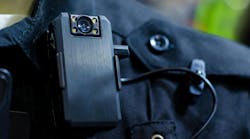VideoSurveillance.com, a leading authority and provider of custom security camera systems, recently interviewed Officer.com’s Editor-in-Chief Frank Borelli, a retired police lieutenant with 30 years of law enforcement experience, on the subject of police and retail surveillance cameras.
VideoSurveillance.com: How many surveillance cameras can a police squad car have and where are they placed?
Borelli: Police squad cars that do operate with security cameras typically have up to three cameras: a dashboard camera to videotape what’s going on in front of the vehicle, a camera placed in the prisoner transport section, and a third camera installed to view the driving compartment.
VideoSurveillance.com: Do squad car surveillance cameras operate 24/7 or are they turned on as soon as the suspect is apprehended?
Borelli: They can be manually activated. If he or she wants, the officer can turn them on. If you get a call for suspicious persons for instance, a lot of the times the officer will pull up and turn on his dash cam and manually activate it because they’re going to get out of their car and be in front of it where they’re interacting with people. Cameras are used to potentially gather evidence as well as cover the officer. But, in most cases I know of, if you activate your emergency equipment, then that camera will be activated along with the vehicle lights or siren or both.
VideoSurveillance.com: What purpose do the video surveillance cameras serve?
Borelli: They’re an impartial evidence gathering tool, which can be used to support either a police officer’s case, or subpoenaed by a defendant’s attorney in an attempt to support their case. Now they can be integrated into speed measuring systems. The inefficiency comes when surveillance cameras are used as a micromanagement tool and you have administrative leadership reviewing videotapes from a disciplinary prospective, simply because they have nothing better to do at some point. It can hurt the morale of officers. Video should be used for evidence, not for checking up on officers. There is also evidence called “Spontaneous Utterance,” that the surveillance cameras can catch. If, when I’ve got my prisoner in transport and I don’t ask the suspect any questions, but they just start talking in the back, that’s called spontaneous utterance and it’s all recorded by the security camera.
VideoSurveillance.com: When have suspects used video against an officer?
Borelli: You may have someone who gets arrested and is sitting in the back of the cruiser and starts to get upset or violent. They may start beating their head on the window or start trying to kick out a window, and thrashing in the back of the car. Even with the seatbelt on, they can move around quite a bit, which could injure them. They may claim that the officer pulled over and beat them as the cause of their self-inflicted injuries. But if we have video of the transport from start to finish – from the moment you got in the vehicle to the moment you got out – and it doesn’t show the officer mistreating the prisoner, but instead reveals the prisoner beating themselves, that exonerates the officers.
VideoSurveillance.com: Are cameras monitored in real-time or are they recorded and then reviewed later?
Borelli: There are systems that do both, but most systems store recorded video that can be viewed later. The video is recorded digitally, so they’re not using videotapes, and it all goes on a memory card which is stored in the trunk of the car, in a secure lock-box so the police officer can’t get in to modify it. Only supervisory personnel have access to the video at that point.
VideoSurveillance.com: Are the cameras hidden or are they clearly visible?
Borelli: The suspect in the car is going to see them if he knows what to look for; however, the cameras are not as obtrusive as they used to be. People should assume there’s always a camera system. Sometimes police officers will warn the suspect that there’s a camera in the car, other times they won’t. It really depends on the circumstances.
VideoSurveillance.com: Have there been instances where the suspect tries to damage the camera?
Borelli: Not that I’m aware of, because they’re usually mounted in such a way where the suspect can’t get to it.
VideoSurveillance.com: Do a large portion of police departments have video surveillance cameras or does it really just depend on each department’s budget?
Borelli: Well, there are over 40,000 police departments in America and the large majority of them have 50 police officers or less. So outside of the really big police departments, many small police departments don’t have the budget for a $3,000 camera system.
VideoSurveillance.com: How is the quality of the video?
Borelli: You’ve got some video that is black and white and other times you have video that is HD quality that you can play on your 72” TV and it would look just fine. It really just depends on the quality of the video capture, the camera itself and the manufacturer.
VideoSurveillance.com: Would you agree that police car video surveillance does more good than harm?
Borelli: I think they can do a phenomenal amount of good, but we have to remember the human side of it. You may have administrators who use it to pick apart what officers do during their entire shift, so if you go that route the amount of harm they can do to the actual officer is huge. But when you look at the evidentiary value and what they can do in court and how they support law enforcement, they do a lot of good. I think on a balance scale, the good outweighs the bad but there is a significant cost attached to it. It can be a problem when just small bits of video are analyzed versus the entire video of the incident. That’s where the misinterpretation can occur.
VideoSurveillance.com: What are your thoughts on video surveillance in retail storefronts – would you recommend retailers invest in security cameras?
Borelli: I think they’re fantastic and I’ll tell you why – it’s because the stores are all insured (in my experience). And having video helps convince the insurance companies to pay off on any stolen or damaged merchandise. If you put a video surveillance system in a commercial entity, you can have reduced insurance premiums, faster reimbursements, and a wonderful insurance adjustment tool to help insurance investigators analyze the crime so you will get your money back faster. I remember a robbery that occurred and when the suspect was running out the door of the establishment he ran into a shelf that was full of glass bottles, knocking several off. As part of the settlement for the loss, the insurance company reimbursed the owner for all the broken bottles but only because it was caught on video. Retail owners are told to stand back and not get in the way, because insurance companies will help cover the losses if a crime is caught on camera and examined by insurance investigators.
We thank retired police lieutenant Frank Borelli for taking the time to speak with VideoSurveillance.com on security camera systems. His knowledge and experience help shed light on police and retail surveillance.



